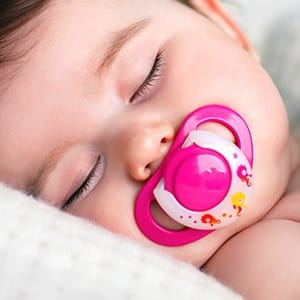Risks Associated with Pacifiers & Thumb Sucking – Fairfax, VA
Keeping Little Smiles Healthy

Babies are naturally inclined to suck on things, as this is how they receive their very first nutrition and comforting food. Most babies’ instinct to suck will usually decrease after the age of six months or so, but others continue to suck on digits or objects when they need a little soothing during toddlerhood and beyond. The thumb is one of the most common — and pacifiers can be helpful for getting many babies to calm down as well. However, if thumb sucking or pacifier use becomes a habit during times of boredom, anxiety, restlessness, or when they sleep, it can have a real effect on the development of their teeth and jawbone. If your little one sucks their thumb or uses a pacifier for too long, they are at risk for a number of oral health issues. Keep reading to find out more about the risks associated with pacifiers and thumb sucking in Fairfax, VA, including what you can do to help break your child’s thumb or pacifier-sucking habit, from your trusted children's dentist.
Side Effects of Thumb Sucking

Sucking the thumb or a pacifier may seem harmless or even cute when your little one does it, but over a long period of time, these habits really take a toll:
- Misaligned teeth and jaws: Your baby’s upper and lower jaws and the teeth within them are busy developing all throughout childhood, and constantly having a thumb or pacifier in the mouth can alter their growth and result in a problem that needs to be corrected later.
- Slanted teeth: The teeth may come in at a protruding angle due to the consistent presence of a thumb or pacifier in the mouth.
- Narrowed roof: Because your little one’s hard and soft oral tissues are extremely malleable during their first few years, it is all too easy for them to mold around a thumb or pacifier during prolonged use.
What’s more, your child may be more vulnerable to harmful bacteria if they are constantly sucking their thumb or a pacifier, which most parents know is likely to fall on the floor and be picked up again repeatedly. In brief, it’s best to keep pacifier usage short and break thumb-sucking habits as soon as they develop.
How to Break a Thumb Sucking/Pacifier Habit

So breaking your child’s oral habit is important — but is it possible? You may encounter anywhere from a little resistance to a lot when you try to pry the thumb or pacifier from their tight grasp. Remember that sucking is a soothing habit, so you may have the most success when you try to reduce what is making them uncomfortable in the first place. Help them find new ways to entertain themselves or self-soothe in times of distress, like when you drop them off for school.
Once you have tried to reduce stress and anxiety for your child, you may want to test some other methods as well. You can find special appliances that make it difficult for your little one to suck his or her thumb, or you can just have them wear a glove while they sleep. You could also start a reward system in which your little one earns a special prize every time they do not suck their thumb.

